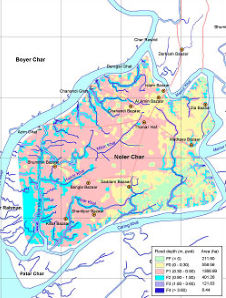
I am Brian O’Donnell, an AidData Project Manager at the College of William & Mary, and in the past three years, I have witnessed AidData grow from a primarily research-oriented resource for Western academics and policy wonks to a truly global platform for sharing all types of development information. With this emerging network in mind last spring, I met with representatives of Bangladesh’s Center for Environmental and Geographic Information Systems (CEGIS) on a visit to Development Gateway’s office in Dhaka.
CEGIS has access to the premier cartographers and geospatial scientists of the region, and as a state-owned, independently-run trust, their analyses are central to government decision making. For example, their predictions on the flooding patterns of the Ganges delta are necessary for local governments to safely plan their residential or agricultural zones.
For me, the meeting illuminated a concern that’s often overlooked when crafting information and communication for development (ICT4D) strategies. You can create as many information systems as you want, but they will not take-off unless the right incentive structures to share and standardize data are mainstreamed.
Invest in Frameworks for Sharing Data
Often, the right in-country partners to transmit geospatial research into real-world results already exist. They have plenty of experience and capacity, but they first need a policy framework for data sharing. Many of the systems they create are only for use by government agencies (or even a single minister), so they do not have the ability to mash-up, say, land-use data or impact assessments with geocoded aid projects.
Inter-agency data-sharing partnerships are a first step before a public, open-source platform will materialize. CEGIS recommended that a first-step in any partnership would be to centralize, standardize, and open the government agency data that already exists, before layering on data from international sources.
Unshared Government Data is a Waste
The good news is this problem has been identified by government decision makers in developing countries. The hard part is justifying the expense on “inter-agency data management structures” over the hottest ICT for development innovation or poverty intervention cure-all. But it begins to make total sense when data is framed as a public good, rather than a cryptic resource for techno-wizardry.
With this mindset, every person a dataset reaches increases its utility and impact, and unshared data resembles government waste. During my time in Bangladesh, I heard one story of a single government minister who knew the password to a land-use data system before he changed it—on the day before switching departments.
Government officials already understand the value of sharing and combining datasets from different ministries, creating common project management systems, and releasing government data into the public domain. With technical capacity in place, the next step is to create systems between data hubs that will encourage a “no-walls” policy in order to maximize the development impact of government data.
